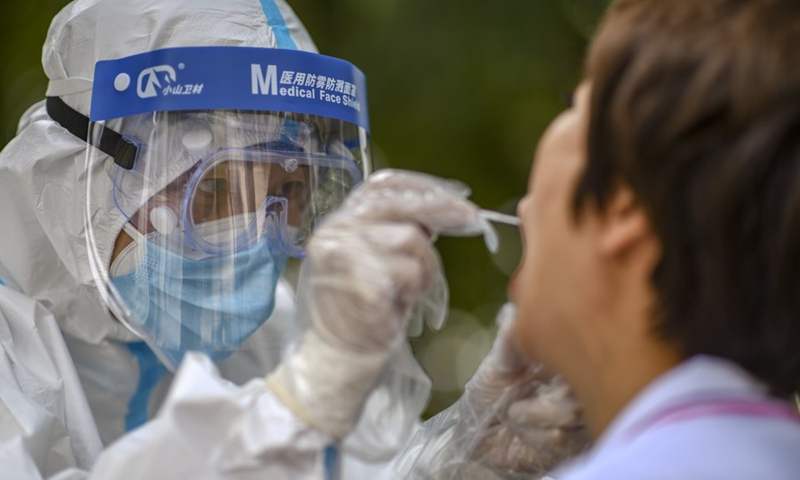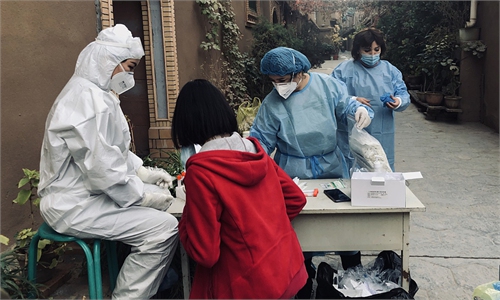Kashi expects little impact from outbreak
Tourism, textile sectors run smoothly as preventive measures kick in

Medical worker Yan Huanjiao collects a swab sample from a resident at Tianshan District in Urumqi, northwest China's Xinjiang Uygur Autonomous Region, July 20, 2020.(Xinhua/Zhao Ge)
Industry insiders and business representatives have seen little impact from the recent resurgence of COVID-19 in Kashi, China's northwestern Xinjiang, after a sudden outbreak there is casting shadows on whether it will disrupt the tourism and textile industries.
As of 2 pm Beijing time on Sunday, 137 new asymptomatic cases had been detected, all related to the factory where the parents of the previous asymptomatic infected person lived, according to the latest press conference by the Xinjiang health authorities.
Correspondingly, four villages and towns in Kashi were designated as high-risk areas at 12 pm on Monday.
In response to rising concerns over the rebound, several cities including Beijing, Chongqing, Changsha in Hunan Province, Harbin in Heilongjiang Province, warned residents not to travel to Kashi city.
Several business representatives of big travel agencies confirmed to the Global Times on Monday that they had stopped sending tour groups to Kashi until the outbreak is contained.
A source with China Travel Service's Xinjiang branch told the Global Times that due to the outbreak, it is no longer accepting or arranging tour groups to Kashi.
However, despite the incident, the office's daily operations have seen little impact from the disruption. Except for Kashi, tourism in other parts of Xinjiang has not been affected, and business has been carried out normally.
The impact appears greater on those travel agencies that focus on Kashi.
A female employee with the Kashi branch of a major travel agency told the Global Times that the suspension of tour groups had put their business in a position of uncertainty.
"At present, we do not know when it will resume, since it all depends on the epidemic prevention and control situation," she said, noting that as the branch is still waiting for a notice of resumption, losses are inevitable.
Independent travelers can still go to Kashi.
A Weibo blogger named Baozoude Lilijiang posted her latest experience as an independent traveler online on Monday, saying that she feels confident that there is no problem there since the city has been implementing strict prevention measures.
"Whether you take a taxi, go to the supermarket or go through an underpass, you will need to scan your QR health code," said the blogger, noting that she was also taken to have a nucleic acid test after arrival.
With the preventative measures in place, the city remains open as usual, with air, rail and road traffic in Kashi running smoothly, Gu Yingsu, deputy director of the Xinjiang health commission, said.
During the recent holidays from October 1 to 8, Xinjiang received 15.35 million domestic tourists, up 10.78 percent on a comparable basis.
Yet due to the impact of the epidemic in the first half of the year, plus the outbreak in Xinjiang in July and in Kashi this month, the momentum of tourism development was restrained, experts said.
"The outbreak in Kashi will have a certain impact on tourism in Xinjiang, but the scope and degree will be much less than the previous two outbreaks," Yang Honghao, director of the Industry Research Institute of China Tourism Academy, told the Global Times on Monday.
In addition to tourism, the textile industry, another major sector in the region, expects only a slight impact from the outbreak.
A manager surnamed Song from the Zhengyang Textile Co based in Kashi, which specializes in cotton products, told the Global Times on Monday that no staff member had tested positive for COVID-19, and the operations of its local plant, including daily production and logistics, were not affected.
However, Song said after the recent outbreak, the factory increased its precautions, including three thorough disinfections of the plants per day and providing free masks for its workers' frequent changes.
Several other factories that the Global Times reached also said that their operations had not been disrupted.
The flare-up in Kashi is not likely to affect local industries like tourism and textiles, two of the leading sectors in Xinjiang, Tian Yun, vice director of the Beijing Economic Operation Association told the Global Times, as Kashi is in the far west of Xinjiang, with limited tourism resources.
"Especially after the thorough mass tests, a tried and tested method from Qingdao, the outbreak will be contained within a month," Tian added.
Meanwhile, the large distances among cities in the region will help control outbreaks.
Cities in Xinjiang are few and far between, and Kashi is a relatively isolated city. The distance from the capital Urumqi and the city of Kuerle is at least 1,000 kilometers in each case.
"On the whole, it was a localized outbreak, and control measures were so tight that we expect only restricted impact on regional industries, especially as economic indicators have now recovered," said Hong Tao, director of the Institute of Business Economics at Beijing Technology and Business University.


